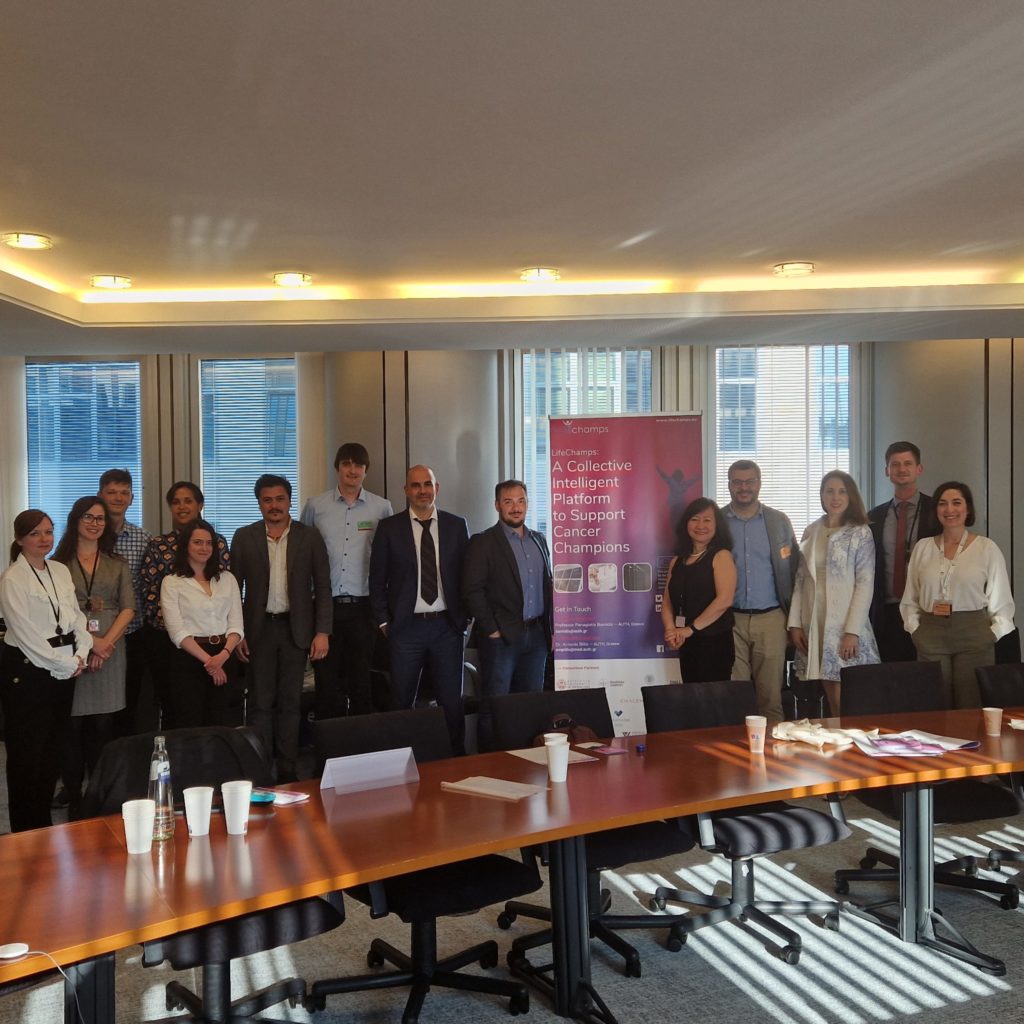Brussels, Belgium – On 30 th May 2023, the LifeChamps project held a two-hour final event at the EU Parliament to discuss the implementation of integrating digital health technologies in cancer care – opportunities, threats, and policy implications. This public event was aimed at presenting the project’s prefinal stage results and its findings within the cancer patient community to wide audiences from academic sector to business companies, healthcare professionals and policy-makers.
Survivorship care is a key component of the EU Beating Cancer Plan that proposes concrete measures to improve the quality of life of cancer patients and survivors, including digital tools. LifeChamps aims to address the inherent complexity caused by cancer treatments and age-related commorbidities and to act in the monitoring of health status and significant improvement of quality of life by using emerging technologies in the fields of Big Data, Data Analytics and Artificial Intelligence. In essence, the project comes up with a novel, context-aware and large-scale analytics framework capable of delivering multi-dimensional support to older cancer life champions during and after their treatments. LifeChamps supports older cancer patients, as well as their caregivers and healthcare professionals, by providing them with an integrated Big Data-driven solution that enables a timely and more accurate clinical decision support at the point of care. Furthermore, complemented by a health recommender system, LifeChamps offers personalized healthcare services (such as symptom monitoring and follow- up care planning) to these patients and their caregivers. The LifeChamps platform proof-of-concept has been validated through four multi-national pilots.
As such, the solution provided by the project consortium of partners led by Aristotle University of Thessaloniki (AUTH) was designed to support the implementation of key objectives of the Europe’s Beating Cancer Plan by improving the well-being and health-related quality of life of the over 12 million older cancer survivors in the EU.
The event was chaired by MEP Stelios Kympouropoulos (EPP, Greece) who addressed the welcome note: “In recent years, we have observed an exponential increase in the development of digital tools that have entered the medical space and transformed the process of clinical decision-making, from early detection and diagnosis, to selecting treatment options, monitoring therapy, and evaluating its outcome. The impact of these innovative approaches is especially visible in the fields of radiology and pathology where computer-based tools acquire approval from the main regulatory agencies.” Mr Kympouropoulos emphasized on the need to “enhance more innovative digital tools and approaches in the field of oncology to help systematize knowledge about current developments and their potential medical applications. A special focus should be given to the advances in digital platforms supporting early diagnosis, response prediction and patients’ stratification”.
Prof. Panos Bamidis (AUTH) in his project implementation introduction stated: “LifeChamps project has been running for some time and approaching the computational side of healthcare on an international level. We successfully bring an operational platform for connecting data from therapists, caregivers and app developers to benefit cancer patients.”
Adela Maghear, Senior EU Affairs Manager at the European Cancer Patient Coalition (ECPC) and moderator of the event pointed out that “Digital tools should start from the needs of healthcare users and be developed with the users, to ensure technology actually facilitates participatory, person-centred healthcare and leads to better outcomes for patients, and better value for society.”
Antonis Billis – Project Scientific Coordinator (AUTH), expressed a view from a scientific perspective:
“Our approach is to combine novel data sources collected from patients and data from the clinical practice to support clinical specialists in their care provision. Harnessing real-world Big Data and machine learning algorithms, we aim to provide person-centered, personalised follow-up and care for the older cancersurvivors. In doing so, data quality is a must to build robust clinical predictive models. In addition, active involvement of cancer survivors and the clinical experts is a prerequisite so that the chances of adopting and embracing our solution in real-life are higher. Towards that direction, we highly appreciate the contribution of the European Cancer Patient Coalition (ECPC) as well as the International Society of Geriatric Oncology (SIOG)”.
Vania-Sofia Santos Tavares, Research Fellow at Capgemini, shared her scientific experience: “The development of clinical prediction models involves meticulous study design to ensure the necessary relevance of the model. With Capgemini’s experience in complex projects, we played a vital role in overcoming data challenges and developing a robust clinical prediction model to identify frailty in older cancer patients. To that end, we needed an assessment of the quality of the data, ensuring its integrity and accuracy. The exploratory data analysis techniques were used to provide valuable information about the variables and their relationships, improving the understanding of the clinical indicator prediction. Moreover, we applied a model evaluation to assess model performance, reliability, and interpretability together with the clinical experts in an iterative way.”
Panos Kartsidis, Research Fellow at AUTH briefly described the ongoing real-life pilot implementation and its challenges: “During project implementation we have recruited 85 patients, so far, out of which 74 have the LifeChamps platform installed in their homes. Participation in the Real- Life pilot study entails the use of a mHealth app and data collection from four types of sensors and questionnaires related with Quality of Life, Frailty, Treatment side-effects, Medication Adherence, Depression & Anxiety and illness perception. Participating patients are using on average the mHealth app 9 times per month, for 20 minutes per session. Participants that concluded the Real-Life pilot offered their testimonies regarding their experience which was mostly positive”.
During the discussion panel,several valuable comments from the long-term and implementation practice were made. In this sense, Dr. Petros Sountoulidis, Associate Professor of Urology at AUTH mentioned the need for collaboration between researchers and app developers. He also revealed the surprising finding that patients were happy that somebody was caring and watching them while using the platform while in the preparation phase ofthe project they expected the opposite, such as lack of trust and unwillingness to cooperate.
Tom Flynn, the co-ordinator of the ‘Cancer Survivorship – AI for Well-being’ cluster initiative stressed the importance of involving patient associations in the process of post-cancer survivorship care.
Keno Bressem, LifeChamps H2020 Advisory Board Member, Radiology Consultant & Digital Clinician Scientist at Charité and coordinator of the COMFORT HE project, explained that in order to improve digital health literacy among the clinical teams it is key to understand both the expectations and the reservations of clinicians regarding AI and to promote an ongoing interdisciplinary exchange of best practice.
Wannes von Hoof, Scientist at Sciensano, said that the European Health Data Space (EHDS) comes with the responsibility for the EU to develop a framework that facilitates and enables data sharing for research purposes, but building trust among patients about the exact purposes and the benefits of using their data is a critical aspect.
Tugce Schmitt, Scientist at Sciensano and coordinating team member of the eCAN Joint Action, emphasized that inequalities in cancer healthcare exist both within and between countries and a mean to address these, is by integrating telemedicine services to standard care.
Wendy Yared, director at the Association of European Cancer Leagues (ECL) and coordinator of the Bumper EU project, explained the most significant challenges in cancer focused apps – life expectancy and sustainability.
Overall, the event provided a valuable opportunity for stakeholders to come together and discuss the challenges and opportunities of integrating digital health technologies in cancer care.



